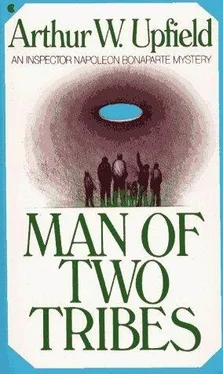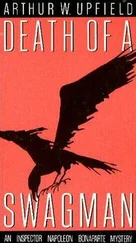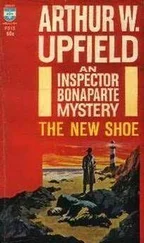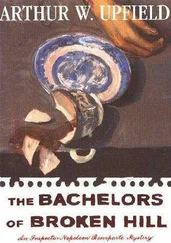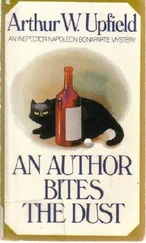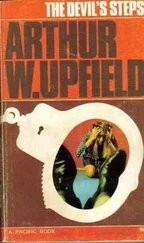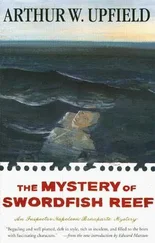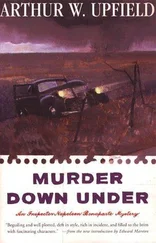Arthur Upfield - Man of Two Tribes
Здесь есть возможность читать онлайн «Arthur Upfield - Man of Two Tribes» весь текст электронной книги совершенно бесплатно (целиком полную версию без сокращений). В некоторых случаях можно слушать аудио, скачать через торрент в формате fb2 и присутствует краткое содержание. Жанр: Классический детектив, на английском языке. Описание произведения, (предисловие) а так же отзывы посетителей доступны на портале библиотеки ЛибКат.
- Название:Man of Two Tribes
- Автор:
- Жанр:
- Год:неизвестен
- ISBN:нет данных
- Рейтинг книги:4 / 5. Голосов: 1
-
Избранное:Добавить в избранное
- Отзывы:
-
Ваша оценка:
- 80
- 1
- 2
- 3
- 4
- 5
Man of Two Tribes: краткое содержание, описание и аннотация
Предлагаем к чтению аннотацию, описание, краткое содержание или предисловие (зависит от того, что написал сам автор книги «Man of Two Tribes»). Если вы не нашли необходимую информацию о книге — напишите в комментариях, мы постараемся отыскать её.
Man of Two Tribes — читать онлайн бесплатно полную книгу (весь текст) целиком
Ниже представлен текст книги, разбитый по страницам. Система сохранения места последней прочитанной страницы, позволяет с удобством читать онлайн бесплатно книгу «Man of Two Tribes», без необходимости каждый раз заново искать на чём Вы остановились. Поставьте закладку, и сможете в любой момент перейти на страницу, на которой закончили чтение.
Интервал:
Закладка:
Arthur W. Upfield
Man of Two Tribes
Nullarbor ‘Friends’
SENIORCONSTABLEEASTERwas roused by the alarm clock at three-forty-five a.m. He told his wife to sleep on, and passed to the kitchen where he fired the wood stove and filled the tin kettle, intending to boil water quickly.
He left the kitchen for the side veranda when the chill of the false dawn was dimming the stars, and there gazed eastward, seeking the first sign of the four-twenty express from Port Pirie. Beyond the house the world was without shape or substance.
Easter moved silently to the front veranda facing the railway buildings, the water tower, the oil containers for the new diesels, and the few cottages occupied by the permanent way men and staff. Other than all this, there was nothing of Chifley: no streets, no shops, no hotel. Save for one illumined window there was nothing of Chifley to be seen at four in the morning.
On a moonless night there is nothing to be seen of the Nullarbor Plain, or of the railway which crosses it for three hundred and thirty miles without an angle Euclid could detect, nothing of all those square miles of table-flat, treeless land beneath which the aborigines believe Ganba still lives and emerges at night to hunt for a blackfellow rash enough to leave his own camp fire to lure a wench from her lawful owner. Now were hidden all the caves, the caverns and blow-holes, and the miles on miles of foot-high saltbush searched by Senior Constable Easter and assistants for Myra Thomas, who disappeared from the four-twenty, five weeks and three days prior to this October morning.
Myra Thomas appeared to have walked off the train at one of the stopping places along the Transcontinental Railway, or had fallen from the train between stops, and in either case, old Ganba had gobbled her up for being out at night to snare another woman’s lawful brute. Damn her, anyway!
Easter returned to his kitchen, brewed tea and set cups on the table without making one sound to disturb his wife. His face and neck and hands were the colour of weathered copper, his light-grey eyes a striking contrast. The sun and wind had bleached his hair and wrinkled his skin, making him look forty when he wasn’t yet thirty. Such was his size and build that only a drunk would dare to start an argument.
His second cup of tea he took to the east veranda, and now light, neither false nor of the true dawn, arched above the edge of the world until it became a long blaze of white magnificence. The express was travelling this section at eighty miles an hour; and still fifteen minutes before it arrived at Chifley.
Well, he had done his utmost to find that blasted woman. Sixteen, eighteen hours a day had he toiled across the endless Plain, organised his trackers, who could find the imprints of a jerboa, but not the trace of a woman’s foot, shod or naked. Week after week the search had proceeded without let-up, and never a scarf or a slipper had they found, let alone a body.
Yes, he had done his damnedest, and so had his trackers. His divisional inspector knew it, and had agreed that the fool woman must have disappeared intentionally.
Then why bother? Why search all over again, as though the woman was the wife of a Railways Commissioner, instead of being a murdering bitch who should have hanged by the neck to stop her ever seeing the Nullarbor Plain? Well, he had better shine himself up to meet this top-notcherfrom the Eastern States who was coming to teach him, Senior Constable Easter, how to follow his forelock.
Shaved, and wearing drill tunic and slacks, Easter poured tea for his wife and swore at the train driver for hooting more than once at the long distance. His wife sat up, smiled her good morning, and asked him had he added coffee to the pot.
“Yes. What a slave I am! I put the grilling chops in the safe. Better go now to meet this bird.”
“Sweet, you are. I’ll get up now. Don’t worry. We’ve had inspectors here before-hundreds of them.”
Lightly kissing her hair, he moved to the door, looked back at her, and grinned because he didn’t feel like smiling this morning.
She heard him pass along the short passage to the front door and down the veranda steps. The train was rumbling into what was called the station, there being no platform, when she slipped into a gown, added fuel to the fire and proceeded to dress. ‘Just too bad,’ was the thought in hermind. After all that work, all the upset routine. Now it would seem that bigger and better brains were to take over.
What did they think her husband was? A new chum? Hadn’t he been born and reared at a homestead down on the south-west corner of the Plain? Hadn’t he been stationed here for six years, and wouldn’t take promotion because he loved every blessed mile of it? And why all the bother about such a woman?
It was all there in Elaine Easter’s mind as she watched the coffee bubbling and heard the chops sizzling.
Toward the end of the previous August, Myra Thomas had faced the charge of murder. The trial was staged in Adelaide, and in South Australia justice is rarely influenced by outside crack-pots.
She was twenty-seven, a smart dresser, and locally renowned as a radio script writer. The husband had been a radio actor, thirty-four years old, handsome, and, by all accounts, a perpetual drinker and an insatiable lover.
The Counsel for the Defence claimed that the husband had been the essence of a blackguard, and that the accused had long been a martyr to his mental frenzies and physical violence. The story went that the husband came home late from a ‘conference’. There had been ‘words’ between them, and he had rushed out to the garage for a pistol. Subsequently there was a struggle, the gun went off, the husband fell dead. Same old story, proving that Australians are not original.
The Prosecution proved that the pistol, a war souvenir, had been recently oiled and yet required strong pressure on the trigger to fire it. The experts swore that the pistol was at least three feet from the victim’s chest when discharged.
To the court officials and the press, the trial was just one of those things, but the accused provided much of interest to all men. She wept throughout. She wept during the judge’s summing-up, and when the jury was absent. She wept whilst being escorted from the court by friends, to receive a mighty ovation from a crowd of teenagers.
The jury’s verdict was a mockery of reason. If ever the jury system was made to appear useless in murder cases, it was by this jury’s verdict, tending to prove that, rather than accept responsibility for a hanging, it would acquit the accused.
For weeks prior to her trial, Myra Thomas received terrific publicity, which during the trial equalled that of the Melbourne Cup. But never a word was published in sympathy for the murdered man.
The ‘heroine’ and her mother decided to leave Adelaide and live in Perth, W. A. They travelled under assumed names, and with them on the four-twenty express from Port Pirie were two other women. The beds were made up after the train left Reid. After leaving Fisher they all retired, and all slept fairly well, only one woman remembering the next morning that the train had stopped several times.
The conductor brought the morning tea when the train was between Deakin and Chifley, and then the three women discovered that the fourth wasn’t with them. The train was searched without result. All stops between Chifley and Reid were contacted, but the missing woman had not left the train to be marooned. The train had to proceed, and the permanent way men searched the line, also without result. Finally, the weary Easter and his weary helpers gave up searching the country for ten miles either side of the line.
It had been hard on Elaine Easter, who had had to cook for and entertain inspectors and sergeants from both Adelaide and Perth, as there wasn’t a hotel at Chifley. The poor things had to eat and sleep somewhere more comfortable than the engine sheds.
Читать дальшеИнтервал:
Закладка:
Похожие книги на «Man of Two Tribes»
Представляем Вашему вниманию похожие книги на «Man of Two Tribes» списком для выбора. Мы отобрали схожую по названию и смыслу литературу в надежде предоставить читателям больше вариантов отыскать новые, интересные, ещё непрочитанные произведения.
Обсуждение, отзывы о книге «Man of Two Tribes» и просто собственные мнения читателей. Оставьте ваши комментарии, напишите, что Вы думаете о произведении, его смысле или главных героях. Укажите что конкретно понравилось, а что нет, и почему Вы так считаете.
